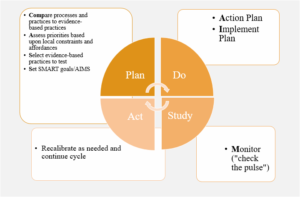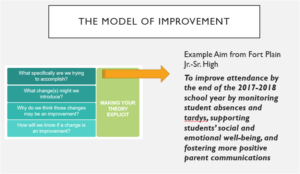Preparing for an Uncertain Future Through Improvement Science: NYKids Offering July 29-30th Direct Support for Continuous Improvement
by Kristen C. Wilcox
In a prior NYKids blog, we described how Improvement science (IS) serves as a resource for school and district leaders and staff to organize their improvement efforts around high leverage actions (i.e. those actions most likely to effect an improvement in light of local needs, values, and resources).
Improvement Science is predicated on the principle that for improvement to take hold and be sustained over time, the work needs to be “problem-specific and user-centered”: That is— the participatory engagement of stakeholders is key to improving. Further, IS proposes that through garnering a diversity of perspectives, school and district leaders can successfully foster improvement initiatives that facilitate individuals’ “seeing the system that produces the outcomes”.
Central to improvement science is a focus on addressing opportunity and outcome disparities that focus attention upon two other IS principles: 1) identifying root causes for “variations in performance” and 2) using measures by which to assess impacts of improvement initiatives.
Why Improvement Science is More Important Than Ever
 Recent changes to educational policy highlight the value of Improvement Science. New York State educators working at any school identified as in need of Comprehensive Support and Improvement (CSI) or Targeted Support and Improvement (TSI) are now required to write a School Comprehensive Education Plan (SCEP) with specific improvement aims. SCEPs draw on the principles of improvement science in many ways: For example, educators are encouraged to work in teams to develop goals for the upcoming school year and identify practices and policies which will achieve those goals. The proposed interventions outlined in each school’s SCEP must detail the ways in which such changes will be implemented and include methods to measure the impact of those interventions. These plans must not only be approved by the school district but include the voices and perspectives of teachers, students, and community stakeholders.
Recent changes to educational policy highlight the value of Improvement Science. New York State educators working at any school identified as in need of Comprehensive Support and Improvement (CSI) or Targeted Support and Improvement (TSI) are now required to write a School Comprehensive Education Plan (SCEP) with specific improvement aims. SCEPs draw on the principles of improvement science in many ways: For example, educators are encouraged to work in teams to develop goals for the upcoming school year and identify practices and policies which will achieve those goals. The proposed interventions outlined in each school’s SCEP must detail the ways in which such changes will be implemented and include methods to measure the impact of those interventions. These plans must not only be approved by the school district but include the voices and perspectives of teachers, students, and community stakeholders.
COVID-19 and the Need for Models of Improvement
With the multiple and significant challenges COVID-19 related disruptions have caused, district and school leaders and staff are pressed to innovate and ensure that each and every child is offered a quality educational experience. And while the COVID-19 disruptions pose significant challenges to student learning, student and educator physical health, and economic threats to individuals and communities, school and district leader and staff burn out and fatigue is of high concern. For district and school leaders, finding ways to streamline and make clear highest priority actions is paramount to keeping staff motivated and on task.
Improvement science based processes and tools can help leaders and staff pull together a coherent theory of action (including a chain of drivers and aims) that can make priorities and related actions and measurement systems clearer and more manageable for all. Four key questions sit at the center of developing a model of improvement:
- What specifically are we trying to accomplish?
- What change(s) might we introduce?
- Why do we think those changes may be an improvement?
- How will we know if a change is an improvement?
Many of NYKids’ school partners have, through our improvement science based process called COMPASS (an acronym for the improvement steps of: COMParing practices to positive outliers/odds-beating schools; Assessing priorities and resources; Selecting levers to improvement; and Setting SMART goals), realized improved systems and improved student outcomes by using this model of improvement.

One example is Fort Plain Central School District where the Junior-Senior High School COMPASS team worked with NYKids in using COMPASS processes and tools to identify specific high priority aims and then engage in the continuous improvement process captured in what is called a Plan-Do-Study-Act (PDSA) cycle.
Details about Fort Plain Junior-Senior High School’s improvement journey can be seen in a journal article and a PowerPoint created by NYKids’ Research and Development Director Kristen C. Wilcox and given at the 2019 University Council of Educational Administrators (UCEA) conference.
How To Develop Your Model of Improvement and Prepare for a Fall of Innovation and Improvement
NYKids’ in partnership with the Capital District BOCES is still taking registrations for an upcoming COMPASS continuous improvement institute that can help district and school leadership teams develop a model of improvement and begin the fall semester on a path of innovation and improvement.

What will your team do?: The COMPASS direct support institute will be offered virtually using Zoom. NYKids Research and Development Director and Associate Professor Dr. Wilcox will provide an overview of key aspects of the model of improvement and the COMPASS process. Facilitators will then use break out sessions to coach teams in the use of tools such as fishbone (causal) diagrams, process maps, and measurement plans. Throughout the two-day institute, participants will be provided “near peer” examples from NYKids’ numerous NY state school case studies to help inform their work. Learning outcomes include:
- Enhanced understanding of improvement science: its tools and processes
- Enhanced understanding of ways to address diversity, inclusion, and equity issues
- Enhanced understanding of how to design a measurement plan for improvement initiatives
- Enhanced team dynamics and communications
When is this opportunity?: July 29th-30th
Reach out to nykids@albany.edu with your questions or sign up here!
